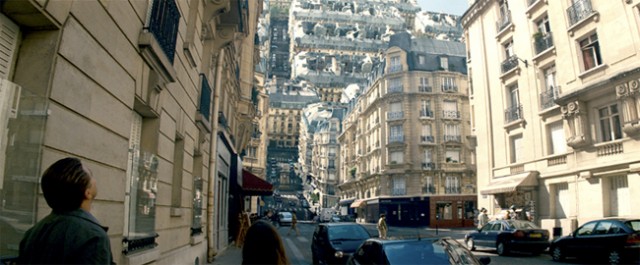
When I first heard about Inception, I wasn’t quite sure what to think. “It looks cool, I guess. Nothing I haven’t seen before.” I’m normally a sucker for mind-bending or “smart” sci-fi. It wasn’t until the Twitter and Facebook chatter of “how great the film was” spread like an epidemic that I decided to actually see it.
I look back at my initial thoughts, and I can’t help but repeat them: It’s nothing I haven’t seen before.
Which, I guess, is why I enjoyed it so much.
Inception is a great Winter film. Were it released during the Holiday season, it may have been this year’s Benjamin Button: a nice thought-provoking diversion, but not a movie that we all had circled, and probably not one that could have been as successful as it has been. Released during the Summer, though, it stands out as being something a little more than just the typical blockbuster action we often expect from the season.
Designed to be Ocean’s Eleven meets The Matrix, the film centers around a team of dream-entering spies on a quest to lay the foundations of an idea in the mind of a businessman. The ability to enter dreams and modify them is (apparently) a near-common thing in the movie’s world. The focus falls on DiCaprio’s Cobb character and his emotional, romantic issues… though the film is quick to move the role of romance to the back of the line.
The visuals are awesome. In one scene, buildings are folded on top of each other to create a Möbius strip of a city which reminded me of Dark City. It’s total eye candy. The idea that the worlds were designed like levels, meant to be inescapable loops, completely fascinated me. The MC Escher stairway references were great. I only wish now that I’d seen it in IMAX instead of regular screen, as some of the wide-angle shots were breathtaking.
From the moment the opening title rolled, to the closing tension-filled (and perhaps stereotypical) “twist” at the end, Inception is constructed to make every moment enjoyable without spending too much time explaining itself. It’s built as puzzle on a few levels: visually, to explore the limits of physics and our ideals of what they could be, and mentally, to keep us wondering what is real and what is dream world. Through its hand-holding of the plot, it begs us to figure things out but doesn’t require anything to be solved for the story to be completed. It’s like watching the best parts of the Matrix with none of the slow “why?” in between.

This does lead to some plot holes, though. For example, the “perfect” team is assembled rather quickly without any of their histories explained and with no real character-building taking place. We never learn if their ultimate plan was successful or not. Finally, the film switches back and forth all too often between a solid story about a team and a shaky story about Cobb’s personal dilemma, leading to confusion about his motivations throughout.
Regardless, it makes for a more enjoyable experience. The film already clocks in at 2.5 hours long and zips by when watching, so any desired depth would have severely slowed and broken the pacing. I don’t believe it’s meant to make us think after the credits roll, but for those who want to the film has a decent amount of layers to it.
We never find ourselves worrying too much about solving all of the film’s riddles. The satisfaction of watching a fun, albeit somewhat formulaic film may be enough to keep us happy for the duration. In a Summer that’s had some downer sequels, it’s a great end cap. And for that alone, I can’t recommend it enough.
[Images and video courtesy WarnerBros]

3 Comments